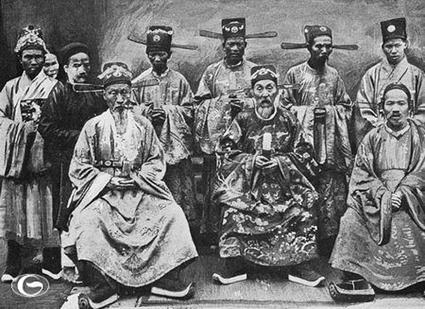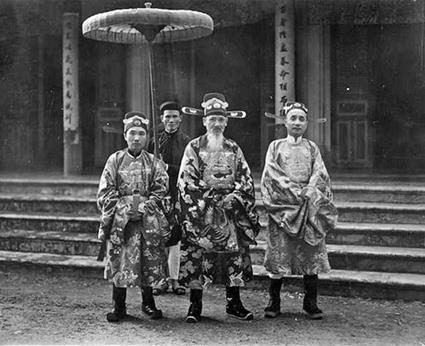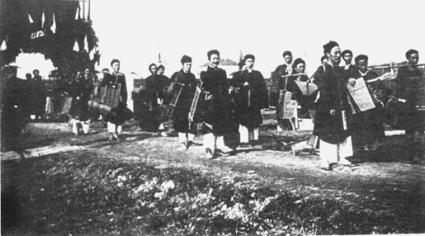Pham Diem
State and Law Institute of Vietnam
Through thousands of years of their existence in Vietnam, various feudal dynasties carried out many administrative reforms with a view to consolidating the kings’ power, including two biggest and most effective administrative reforms, one during the Le dynasty of King Le Thanh Tong (the second half of the 15th century) and one during the Nguyen dynasty of King Minh Mang (the first half of the 19th century).

In the aspect of higher effect and efficiency of operation of the state administration, especially local administrations, such feudal administrative reforms are characterized by the following prominent features:
Classification of local administrations
The Vietnamese feudal regime was often structured with local administrations at four levels:
- The centrally administered administration: The local administration at this level was called “lo” under the Ly-Tran dynasties (from the 11th thru 15th century) or “dao”(sector), then “xu” or “thua tuyen” during the early Le dynasty. Provincial-level administrations were set up for the first time under King Minh Mang.
- The “phu” (inter-district) administration, which was headed by “tri phu”.
- The “huyen” or “chau” administration, which was headed by “tri huyen” or “tri chau”. During the feudal time, mountain districts were usually called “chau” with its vestige can now be seen in such geographical names as Moc Chau and Thuan Chau districts of Son La province, or Mai Chau district of Hoa Binh province. Usually, the royal courts appointed tribal chiefs as “tri chau,” aiming to bind them to the central administration and to prevent separation. As the tribal chiefs were familiar with local customs and practices of ethnic minorities, their rule proved more effective. Moreover, the royal courts often sent their mandarins to assist “tri chau” in administrative experience, thereby to supervise their rule.
- The “xa” (commune)-level administration, which served as the grassroots administrative unit. It was headed by a mandarin called “xa quan” during the Ly - Tran dynasties, then “xa truong” under King Le Thanh Tong’s rein, which was changed into “ly truong” from the time of King Minh Mang.
Especially, unlike the feudal regimes in Europe or China, the Vietnamese feudal dynasties let “xa quan,” “xa truong” or “ly truong” be elected by villagers. During their administrative reforms, they attached great importance to the reform of local administrations at two levels, namely the centrally administered administration and the commune-level administration which directly supplied human and material resources for the state through tax collection, corvee mobilization and military conscription.
Under King Le Thanh Tong’s reign, the country was divided into “dao” (sectors). For the administration at this level, the king applied the administrative reform measure of power decentralization, dividing the state power to three different bodies called “ty” for enforcement, each taking charge of one or a number of fields. They included:
- “Thua chinh su ty” or “Thua ty” for short, which took charge of administrative, financial and civil affairs;
- “Do binh su ty” or “Do ty,” which took charge of military affairs;
- “Hien sat su ty” or “Hien ty,” being in charge of adjudication and supervision of all mandarins in their respective sector.
Such power decentralization in localities aimed not only to prevent the abuse of power by local administrations but also to assist local mandarins in specializing certain fields under their rule.
By the time of King Minh Mang, the country was divided into provinces, each of which was headed by a governor general, who was assisted by “bo chanh,” a provincial mandarin in charge of financial matters, and “an sat”, a provincial mandarin in charge of adjudication. So, the provincial-level administration’s power was, on the one hand, concentrated into the hand of a person, and, on the other hand, assigned to others to certain extent.
Especially for the grassroots administration at the commune level, it was, for thousands of years, dualistic in nature, demonstrating, on the one hand, its autonomy from the central administration as seen in the best-known Vietnamese saying ”Phep vua thua le lang” (The king’s rule comes after the village’s customs), and, on the other hand, its self-governance of village affairs. As a result, different feudal dynasties sought ways to restrict its autonomy to consolidate the royal power, while maintaining its self-governance so as to ensure the effect and efficiency of management of villages.
Typically under King Le Thanh Tong’s rule, the feudal state reformed the village management apparatus by applying the following two measures:
First, classifying communes into small communes, medium communes and large communes, depending on the number of households in communes, thereby, rationally determining the to be- paid tax amount, the number of to be-mobilized corvee laborers and the number of to be-conscripted men for each commune.
Second, setting criteria for “xa truong” (commune or village chiefs), even though they remained to be elected by villagers themselves. Such criteria included:
- “Xa truong” must be elected from among aged persons who have high prestige and are knowledgeable;
- Two brothers cannot be simultaneously elected as “xa truong,” aiming to ward off factionalism; and
- “Xa truong” must be non-corrupt, have good health and capabilities to perform their tasks. Those who are corrupt, old and weak or incapable must be regularly replaced.
The regime of recruitment, appointment and examinations of mandarins
In the feudal regimes, mandarins were recruited by the following three major modes:
- “Nhiem tu” (also called “tap am” or “am sung”), by which grown-up children or grandchildren of mandarins or aristocrats could be recruited by the State to be mandarins;
- “Tien cu” (recommendation), by which mandarins and aristocrats were obliged to annually recommend persons with good virtues and talents to the State for recruitment as mandarins; and
- “Khoa cu” (competition examinations), by which the State recruited persons who passed competition examinations to be mandarins, which became the most familiar mode of recruiting feudal mandarins.
During King Le Thanh Tong’s time, the mandarin recruitment regime was comprehensively and specifically legislated. Most mandarins then were recruited through competition examinations.
Especially in Hong Duc time, the mode of “tien cu” (recommendation) was called “bao cu” (guaranteed recommendation), by which mandarins had to recommend right persons with good virtues and talents. If they recommended relatives who had no virtue and talent, they would be punished. Historian Phan Huy Chu remarked: “Bao cu appeared in Hong Duc time. Due to severe penalties, no one dared to recommend impartially; hence, virtuous and talented persons were worthily recruited”1. King Minh Mang attached special importance to the recruitment of virtuous and talented persons via “bao cu,” stating in a royal decree: “The State always treasures virtuous and talented persons. I myself think day and night of the recruitment of qualified and capable persons, fearing that this is not known to scholars in far-flung regions. So, if you know virtuous and talented persons, you should report them to me.” The King also issued an order called “le lam cu” (order on abuse of recommendation), saying that those who recommended improper persons, who were their relatives or incapable persons, would be demoted by two ranks and transferred to other localities.
If the “tuyen bo” (recruitment and appointment) regime aimed to select mandarins, the mandarin testing regime aimed to assess the virtues, capabilities and performance of incumbent mandarins, which served as a basis for reward or punishment, rank promotion or demotion. Under King Le Thanh Tong’s rule, the mandarin testing contents covered:
- Test of mandarins’ educational and professional qualifications. Civilian mandarins had to sit literary examinations with subjects given by the king (writing of poems, deliberation on political affairs, adjudication of cases, etc.) while military mandarins had to gather in the royal capital for martial competitions.
- Test of mandarins’ morality, industriousness and work efficiency. The evaluation of these aspects was based on such specific criteria as: Whether they care for local inhabitants or not; whether many or few people in their localities had to migrate to other localities; whether they harass people for bribe or not; whether they are complained or sued by people or not; the number of cases they have handled or left unsettled; the number of cases adjudicated justly or unjustly, etc.
The testing procedures and time were prescribed as follows: The preliminary test was carried out once every three years and the final test (called “thong khao”) was organized once every 9 years. Mandarins in Bo Lai (the agency in charge of promotion, appointment, recruitment, law and training of mandarins) coordinated with mandarins of Ngu Su Dai (in charge of personal affairs in the bureaucrat system and judicial judgment) in supervising the tests, promotion and demotion of local mandarins nationwide. Those mandarins who passed three preliminary tests would sit the final test (thong khao), where their performance and virtues were all scrutinized with comments sent to Bo Lai, which would decide by itself or report to the King for decision on commendation or penalty, promotion or demotion of such mandarins, depending on their low or high ranks. Mandarins with special talents would be promoted under the king’s order while those committing serious mistakes or crimes would be immediately punished.
Commenting on the mandarin testing regime during King Le Thanh Tong’s tenure, Phan Huy Chu wrote: “The Le dynasty’s mandarin- testing regime is extremely fine.... Non-corrupted, righteous and industrious persons are commended while incapable and immoral persons are deposed. Mandarins try their best, political affairs are good...”2.
In short, the mandarin recruitment and testing regimes gave birth to a pool of virtuous and talented mandarins, greatly contributing to assuring the effect and efficacy of operation of the feudal state.-


